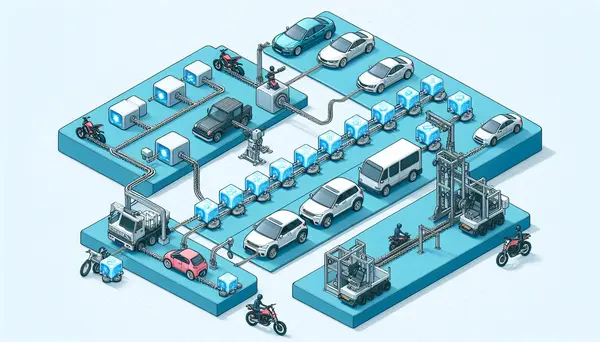Posts on the Topic Smart-contracts

Blockchain technology enhances the security and integrity of intellectual property (IP) by providing decentralized, immutable records, timestamping, smart contracts for automated enforcement, and verifiable proof of ownership. Successful implementations like IP-Hour, Ascribe, Verisart, and DEIP demonstrate blockchain's effectiveness in protecting...

Decentralized Finance (DeFi) offers innovative financial systems but comes with risks such as smart contract vulnerabilities, liquidity issues, market volatility, and regulatory uncertainties. To mitigate these risks, investors should engage in projects with audited contracts, diversify investments, stay informed about...

The article explores the rapid growth of decentralized finance (DeFi), driven by factors like increased adoption, innovative financial products, and accessibility. It also highlights key DeFi platforms such as Uniswap, Aave, Compound, MakerDAO, SushiSwap, and Yearn.Finance that offer diverse services...

The article explores the transformative impact of Decentralized Finance (DeFi) on traditional financial systems through innovative projects that offer accessible, transparent, and efficient services. It highlights key features such as smart contracts, interoperability, yield farming, governance tokens, Layer 2 solutions,...

DeFi (Decentralized Finance) operates without traditional intermediaries using blockchain technology, offering services like lending and trading in a decentralized manner, while CeFi (Centralized Finance) involves financial institutions managing transactions under regulatory oversight. The article explores the differences between DeFi's permissionless...

The article discusses the rise and impact of DeFi (decentralized finance) apps, which operate on blockchain technology to provide financial services without traditional intermediaries like banks. It covers their evolution from Bitcoin's inception in 2009 to Ethereum's smart contracts, categorizes...

The DeFi ecosystem leverages blockchain technology to create decentralized, transparent, and automated financial markets that are accessible globally without intermediaries. Key components include cryptocurrencies, tokenized assets, smart contracts, data oracles, and human governance; notable applications like MakerDAO and Compound demonstrate...

Decentralized Finance (DeFi) is transforming passive income generation by leveraging blockchain technology to offer innovative methods such as liquidity provision, staking, yield farming, and lending. These DeFi activities eliminate intermediaries through smart contracts, providing global accessibility and transparency while offering...

DeFi, or decentralized finance, leverages blockchain technology to recreate traditional financial systems without intermediaries, using smart contracts on networks like Ethereum for increased accessibility and transparency. Key components include DApps, decentralized exchanges (DEXs), lending platforms, stablecoins, yield farming mechanisms, and...

Decentralized Finance (DeFi) leverages blockchain technology to offer financial services without traditional intermediaries, providing transparency, accessibility, and efficiency. DeFi coins enable activities like lending, borrowing, trading, staking, and yield farming within a decentralized framework; popular examples include Avalanche (AVAX), Chainlink...

Mt Pelerin is a platform merging traditional finance with cryptocurrency, offering services like tokenized asset management and crypto-fiat exchanges within a secure ecosystem. It emphasizes user accessibility, compliance, and technological innovation to shape the future of decentralized finance....

The blockchain industry has rapidly expanded, with a mix of innovative startups and established companies driving adoption by offering services like financial transactions, supply chain management, digital identity verification, and smart contract development. These entities are key in developing secure,...

Blockchain technology is a decentralized database that enhances security and transparency in electronic transactions, initially developed for Bitcoin but now applicable across various sectors. It operates on the principle of an immutable distributed ledger with advanced cryptography to maintain transaction...

Blockchain ledger technology provides a secure and transparent way to record transactions, using cryptography to link blocks of data in an immutable chain. It enables trust without central control by distributing the database across network participants, supporting applications beyond cryptocurrencies...

Blockchain is a decentralized technology that enables secure, transparent transactions across a distributed network of computers without the need for central authority, revolutionizing data management and applications beyond cryptocurrencies. It uses cryptographic algorithms to create an immutable chain of blocks...

Blockchain notes revolutionize digital information management by leveraging blockchain technology to create secure, collaborative, and verifiable text entries that are resistant to tampering. This innovation offers significant benefits for industries reliant on record-keeping by ensuring data integrity through an immutable...

Blockchain technology offers transformative potential for the logistics industry by enabling more efficient, transparent supply chains and reducing costs through secure data sharing among stakeholders. The integration of blockchain enhances security, auditability, inventory management, reduces paperwork, and improves stakeholder collaboration...

This article provides a beginner's guide to understanding blockchain technology, explaining its decentralized nature and how it uses cryptography for secure transactions. It covers the structure of blockchains with blocks, nodes, and networks that ensure transparency and consensus without central...

Blockchain technology underpins a digital revolution, enabling secure and transparent transactions that could transform various sectors beyond cryptocurrencies. These projects aim to create decentralized applications with benefits like censorship resistance and operational efficiency while also facing challenges such as scalability...

Bitcoin bridges enhance the cryptocurrency ecosystem by enabling transfers between different blockchains, expanding Bitcoin's utility and fostering a decentralized digital economy. They come in various types including trusted, trustless, unidirectional, and bidirectional bridges to cater to diverse needs and security...

Blockchain Week brought together global blockchain enthusiasts and experts, highlighting technological advancements, regulatory discussions, and the importance of collaboration for industry growth. Innovations such as a new consensus algorithm and cross-chain interoperability solutions were unveiled, emphasizing the event's role in...

Blockchain protocols are the foundational rules that govern how blockchain networks operate, ensuring secure and consistent transactions across a decentralized ledger. These protocols enable cryptocurrencies like Bitcoin and Ethereum to function without central authorities by using consensus mechanisms such as...

Blockchain technology can revolutionize supply chain management by increasing transparency, reducing inefficiencies and fraud, and eliminating delayed payments. By recording transactions in a secure, unalterable digital ledger across multiple computers, blockchain provides end-to-end traceability of products from manufacturing to delivery,...

Blockchain technology has the potential to revolutionize the insurance industry by addressing issues such as fraud, lack of transparency, and inefficient processes. It provides enhanced security, scalability, transparency, and efficiency, benefiting both insurance companies and policyholders. However, there are challenges...

The article discusses the role of Blockchain in revolutionizing the supply chain management industry. Blockchain technology provides transparency, efficiency, and traceability in supply chain processes, leading to benefits such as real-time tracking, reduced administrative costs, greater accountability, improved inventory management,...

Blockchain technology has the potential to revolutionize digital advertising by providing increased transparency, trustworthiness, and fraud prevention. It can also improve data privacy protection and enable more efficient and economical transactions. Real-life examples, such as Brave, AdEx, and MadHive, showcase...





